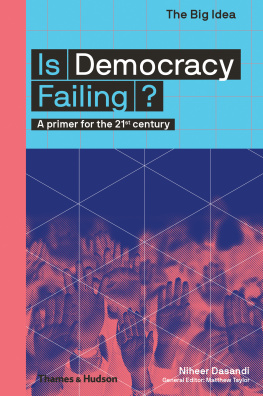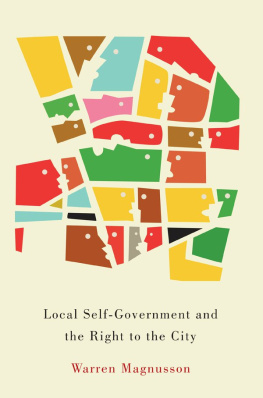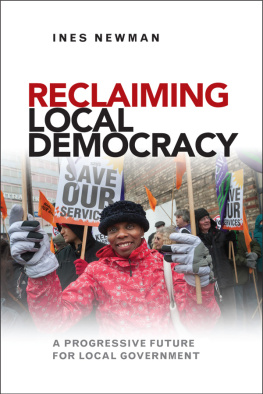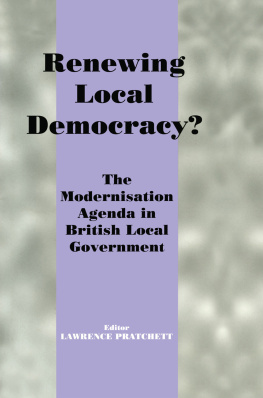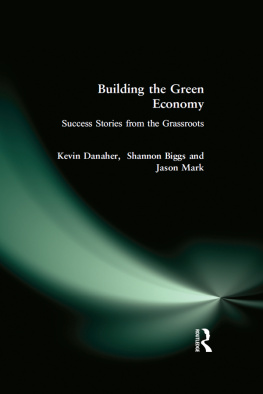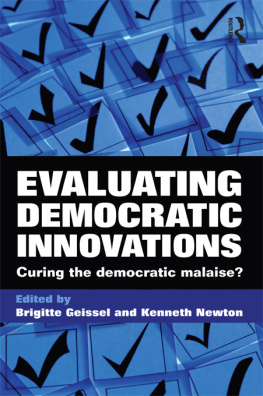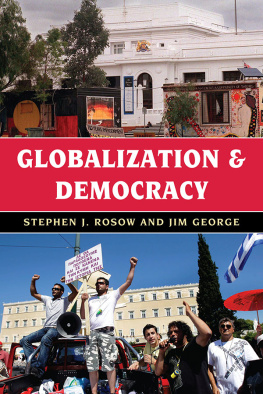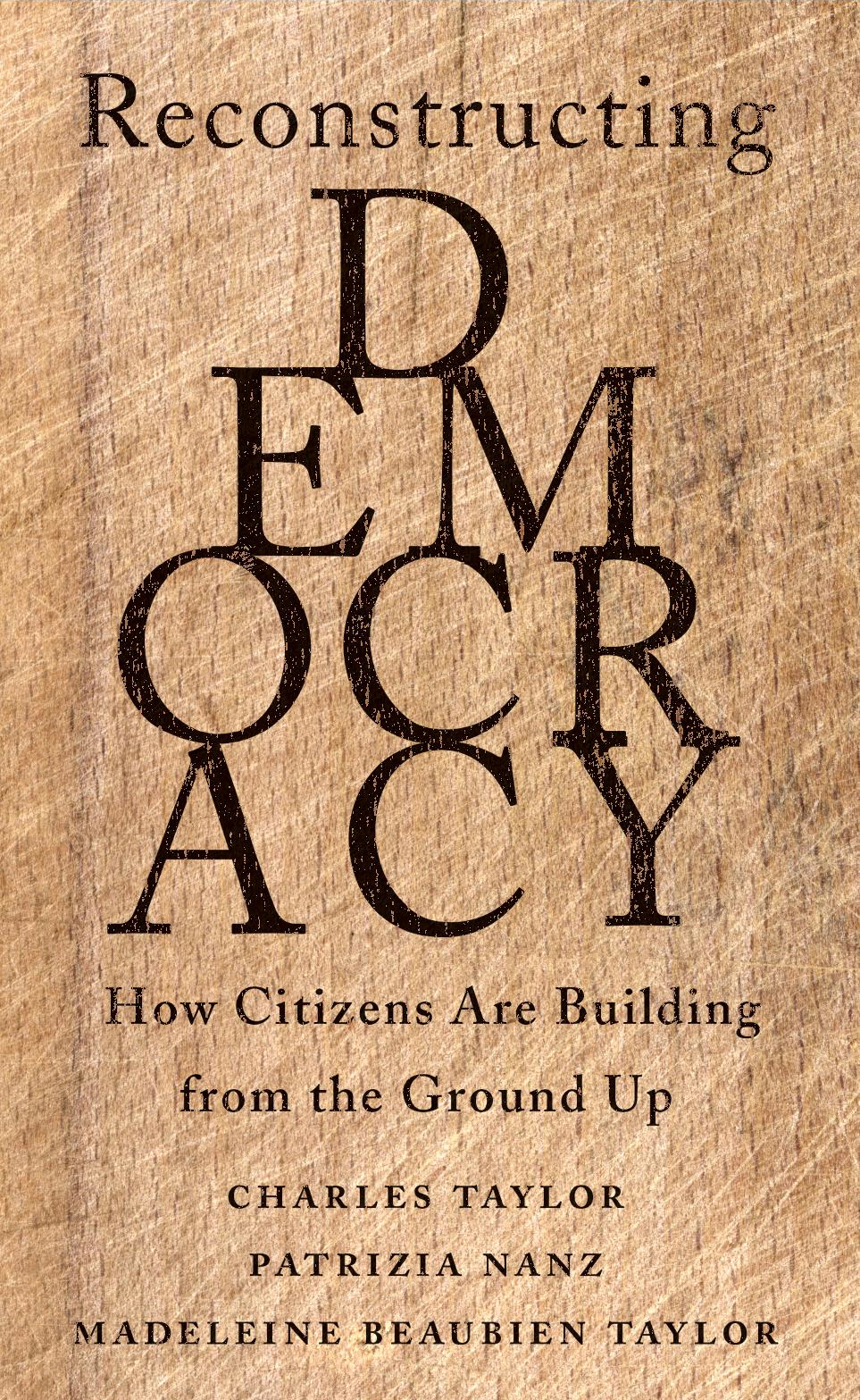Contents
Guide
Pagebreaks of the print version
RECONSTRUCTING DEMOCRACY
How Citizens Are Building from the Ground Up
Charles Taylor
Patrizia Nanz
Madeleine Beaubien Taylor


Cambridge, Massachusetts
London, England
2020
Copyright 2020 by the President and Fellows of Harvard College
ALL RIGHTS RESERVED
Jacket design: Graciela Galup
Jacket art: background from Getty Images
978-0-674-24462-7 (cloth)
978-0-674-24663-8 (EPUB)
978-0-674-24664-5 (MOBI)
978-0-674-24665-2 (PDF)
The Library of Congress has cataloged the printed edition as follows:
Names: Taylor, Charles, 1931 author. | Nanz, Patrizia, author. | Taylor, Madeleine, author.
Title: Reconstructing democracy : how citizens are building from the ground up / Charles Taylor, Patrizia Nanz, Madeleine Beaubien Taylor.
Description: Cambridge, Massachusetts : Harvard University Press, 2020. | Includes bibliographical references and index.
Identifiers: LCCN 2019042310
Subjects: LCSH: Community power. | Political participation. | Democracy.
Classification: LCC HM776 .T37 2020 | DDC 321.8dc23
LC record available at https://lccn.loc.gov/2019042310
CONTENTS
T HERE IS widespread belief in Western societies that our democracies are in trouble. Numerous polls show that people are losing confidence in democracy as a system. Young people in particular think that democracy is a poor form of governance and that an authoritarian or technocratic regime would be a better alternative. At the same time, political developments are causing deep divisions among citizens within democratic societies. For example, the vote for Brexit in the United Kingdom and Donald Trumps successful campaign for the US presidency, which invoked nostalgia for a lost past when America was great, have resulted in xenophobic appeals to exclude those deemed outsiders. These appeals are directed at those who already feel that society has left them behind.
The erosion of the welfare state and the encroachments of the economic system have opened peoples eyes to the fact that they live not only in market economies but in capitalist societies where economic affairs are no longer embedded within social interactions. This separation is essential to the neoliberal policies that have been dominant in recent years. In fact, both democratic politics and various aspects of everyday life have been subjugated to the managerial logic of corporations and banks. The claims made during and after the financial crisis of 2008 that certain banks were too big to fail and had to be rescued at all costs, and that there was no alternative to the specific conditions that bailout deals presented to Greece and several other countries in the eurozone, severely undermined these democracies. By its very nature democratic politics must always offer more than one avenue out of crises.
Social media and digital communication technologies in general have also played a significant role in the erosion of democratic culture over the last decade. On the one hand, digitalization provides citizens with easy and broad access to information and conveys the impression that their views and actions matter. Initiatives such as www.govtrack.us and @YourRepsOnGuns in the United States, www.theyworkforyou.com in the United Kingdom, and www.openaustralia.org.au in Australia have greatly increased the transparency of political decision-making and enabled like-minded people to build networks and mobilize. On the other hand, the largely anonymous social networks of Web 2.0together with depoliticized television programming (or pseudo-politicized, in the case of talk shows)distance citizens from the political sphere. With its focus on finding sympathetic others within echo chambers that reject or excoriate dissenting opinion, this form of media consumption acts as a barrier to collective learning and meaningful deliberation. Instead, it provides fertile ground for electronic populism.
In a nutshell, liberal democracies face two major, intertwined problems: the decline of their problem-solving capacities and the gap between political elites and the people. Democratic systems dont deliver better futures (think of environmental policies) not only because lobbies and corporations are so powerful (for example, the car industry or oil lobby), but also because elected officials often dont know which policies are adequate or are afraid to take drastic measures that might not be supported by their constituents. Politicians are afraid to take responsibility because they are not sure what the people want or would accept. Those courageous enough to advance unpopular policies risk the kind of backlash that we see in France with the gilets jaunes. This recent protest movement against environmental policy reform in France grew out of the (justified) sense that President Macrons plan to increase taxes on fossil fuels disregarded the dependency of lower-income, rural households on affordable diesel. Soon, right-wing populist politicians like Marine Le Pen managed to channel at least part of the outrage.
Of course, national governments are constrained by political globalization. But they are also limited by global accords such as the Paris Agreement, with its goal of limiting global warming to well below 2C above preindustrial levels and decarbonizing the global economy to prevent dangerous climate change. Transformations toward sustainability must be implemented not only at the global level but also through the adoption of sustainable modes of living that can only be developed by politicians at the national and, especially, the local level. It is here that democratic politics needs to be revitalized.
Many people believe that our representative systems have to be reformed, down to changes in the structure and mode of operation of political parties that play a central role in them, and that the excessive power of money in these systems has to be curbed. Others propose reforms in our public spheres, which have become divided as never before in noncommunicating echo chambers created by social media. For example, they suggest the establishment of public platforms as alternatives to Facebook and other social media, or state-controlled platforms to rein in the distribution of deliberately misleading information.
We agree that changes of this kind are necessary, but we would like to add to the agenda of reform. We believe that to restore responsible government we must reconstruct democracy from the bottom up. Only if we enhance and reinvigorate democracy at the base will the citizenry find clarity about what to ask for, or what future to envision for their community or region. Only then can local communities put pressure on their representatives in policy-making bodies to push for more courageous policies.
In this book, we first delineate the challenges faced by local communities and their residents. The degeneration of democracy is strongly connected to the erosion of local communities. For example, localities devastated by deindustrialization, such as those found in the Appalachians or the Rust Belt in the United States or in the Lausitz region in Germany, often become strongholds of xenophobic populism.







